Drug Holidays: When Taking a Break from Medication Can Help - and When It’s Dangerous
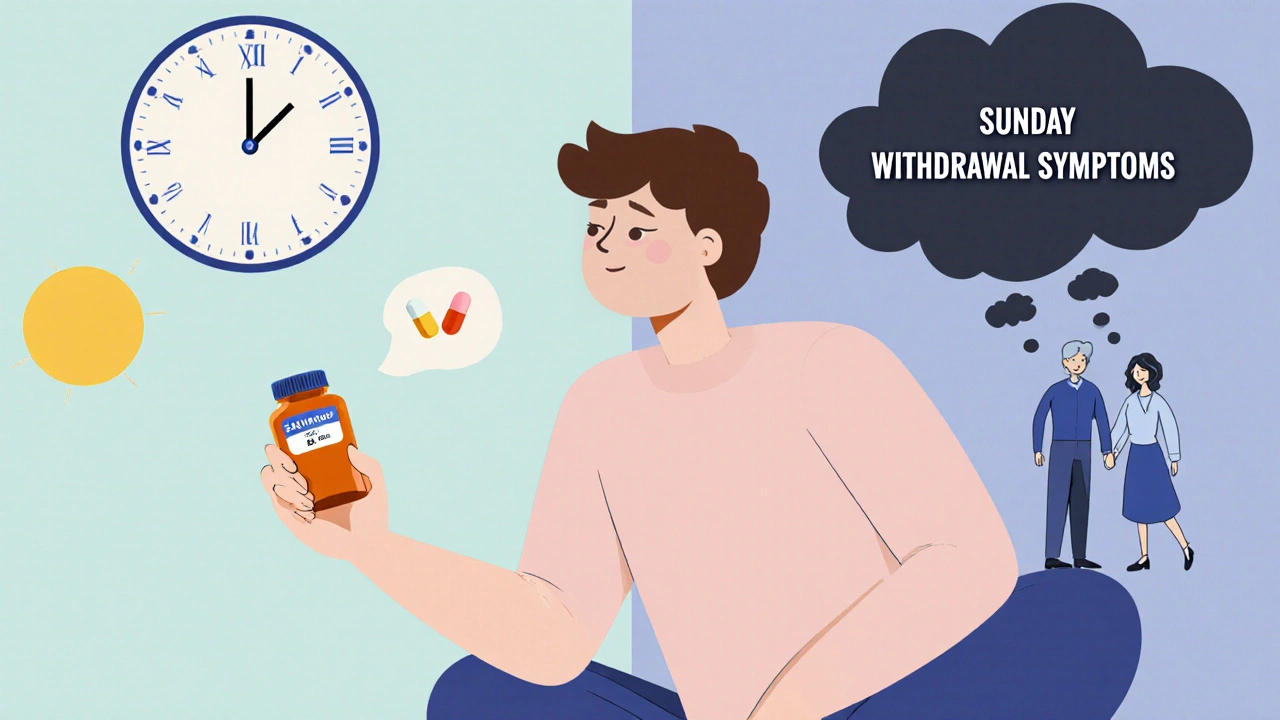
Drug Holiday Safety Calculator
Stopping your medication on purpose sounds like a bad idea. And often, it is. But for some people, a carefully planned drug holiday - a short, supervised break from a prescribed drug - can make life noticeably better. It’s not about skipping pills because you feel fine. It’s not about running out and hoping for the best. It’s a medical strategy, used in specific cases, with clear rules and risks you need to understand.
Why Would Anyone Stop Taking Their Medicine?
People don’t take drug holidays because they’re tired of their prescriptions. They do it because the side effects are wearing them down. For someone on an SSRI like fluoxetine (Prozac), sexual dysfunction can be so severe it damages relationships. For a child on Adderall, appetite suppression might stunt growth. For an adult with Parkinson’s, constant tremors and stiffness can feel worse than the disease itself. A drug holiday isn’t about quitting treatment - it’s about resetting the body’s response to the drug so it can work better when you restart. The goal? Reduce side effects. Test if you still need the medication. Improve quality of life. But these benefits only show up when the break is planned, monitored, and timed right. Doing it on your own? That’s a different story.Which Medications Might Allow a Break?
Not all drugs are made equal. Some can be paused safely for a few days. Others? Stopping suddenly can land you in the ER. Antidepressants (SSRIs) are one of the most common candidates. Fluoxetine, with its long half-life (4-6 days), is often used for weekend breaks - two days off, five days on. Studies show about 65% of people see improvement in sexual side effects without a return of depression symptoms. Paroxetine, on the other hand? Its short half-life (21 hours) makes it risky. One missed dose can trigger brain zaps, dizziness, nausea. That’s why doctors rarely recommend holidays for it. ADHD stimulants like methylphenidate (Ritalin) and amphetamines (Adderall) are another area where breaks happen - mostly during summer or school holidays. Parents hope their kids will eat better, sleep longer, or grow taller without daily doses. But here’s the catch: 78% of children experience a rebound in symptoms. That means more tantrums, trouble making friends, trouble in camp or sports. One mother told the Child Mind Institute her son’s baseball coach noticed he couldn’t focus during practice - and asked her to restart his meds. His self-esteem tanked. Anticonvulsants, beta-blockers, corticosteroids? No. Not ever. Stopping these suddenly can cause seizures, heart attacks, adrenal crisis. These are absolute no-go zones for drug holidays.What the Research Says - and What It Doesn’t
The biggest lesson from decades of research? Context matters. A drug holiday that works for one condition can be deadly for another. In HIV treatment, the idea was tested in the 2006 SMART trial with over 5,000 people. The results were shocking: those who took breaks had a 50% higher risk of opportunistic infections and a 64% higher chance of heart problems. The trial ended early because it was too dangerous. Today, continuous HIV treatment is standard. In Parkinson’s, drug holidays were common in the 1980s. Doctors thought giving the brain a rest from dopamine meds would help it respond better. Instead, patients had worse tremors, more falls, and 22% higher hospitalization rates. The practice was abandoned. But for depression? The data is mixed but promising - if done right. A 2020 study in the Journal of Sexual Medicine found weekend SSRI breaks helped 65% of patients without triggering relapse - as long as they’d been stable for at least six months. A 2021 NCBI review showed 68% success with structured plans versus just 22% when people stopped on their own.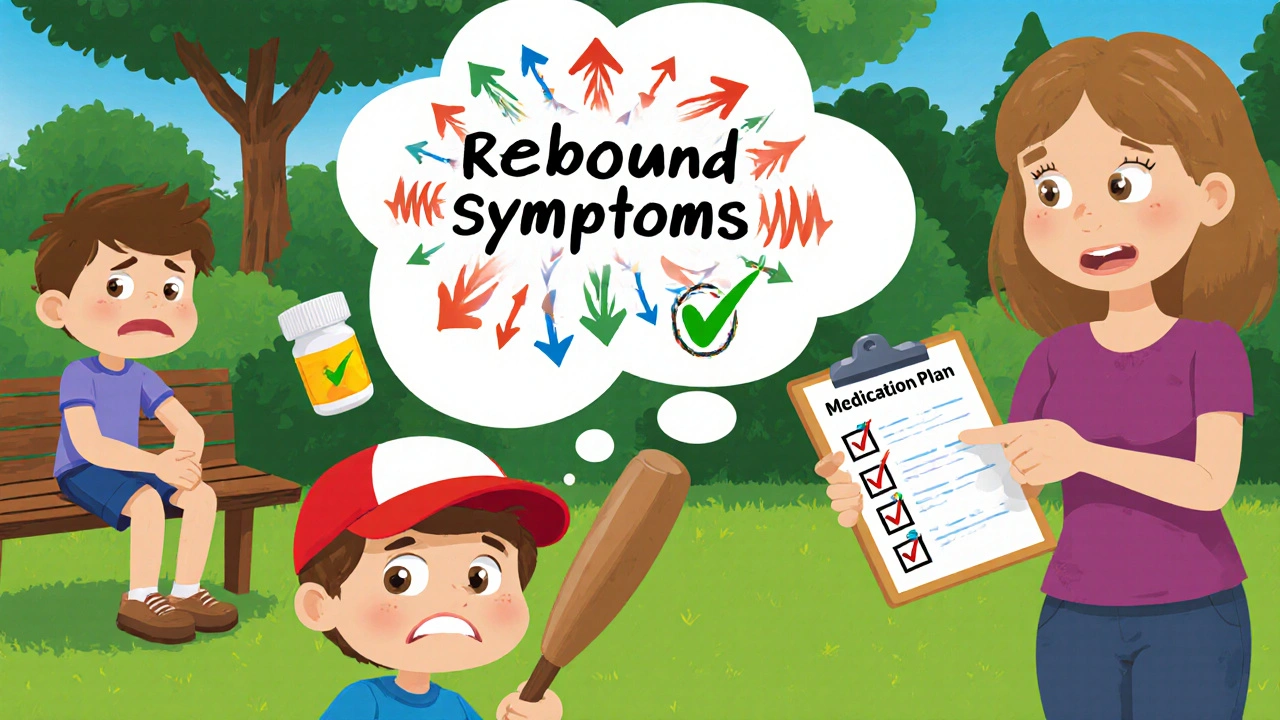
Real People, Real Experiences
Online forums tell stories that research papers can’t capture. On Reddit’s r/ADHD, a parent wrote: “We tried a summer break. My 10-year-old couldn’t sit still. He ran into the street twice. We had three ER visits. It wasn’t a vacation - it was chaos.” That’s not rare. 62% of surveyed parents in that community said summer breaks made family life harder. On PatientsLikeMe, someone on Prozac shared: “Two days off every weekend brought back intimacy with my partner. No mood dip. No guilt. Just… normal.” That’s the sweet spot - short, controlled, intentional. But 41% of users on Drugs.com reported unexpected withdrawal symptoms: brain zaps, headaches, insomnia. These weren’t planned holidays. These were accidental stops. That’s the line between strategy and risk.How to Do a Drug Holiday Right
If you’re considering this, here’s what you need to know before you even talk to your doctor.- Wait until you’re stable. Don’t try a break in your first month on medication. Most guidelines say at least six months of consistent symptom control before even considering it.
- Track your symptoms. For 4-8 weeks before the break, log your mood, sleep, energy, side effects. This gives your doctor a baseline to compare against.
- Plan the length. Weekend breaks for SSRIs? Usually 48-72 hours. ADHD breaks? Rarely longer than 8-12 weeks. Longer than that? You’re not resetting - you’re risking relapse.
- Know your triggers. What signs mean you need to restart? Is it irritability? Trouble sleeping? Racing thoughts? Write them down. Share them with your family or caregiver.
- Have a backup plan. What if you feel awful on day three? Who do you call? When do you restart? Get this in writing. The FDA recommends clear emergency instructions for every medication holiday.
What Your Doctor Should Do
A good doctor won’t just say “sure, take a break.” They’ll guide you through it. They should:- Review your medication’s half-life and metabolism
- Check for drug interactions that could worsen withdrawal
- Recommend a taper (like reducing dose by 25% per week) if needed
- Set up a 72-hour follow-up after the break ends
- Document the plan in your medical record
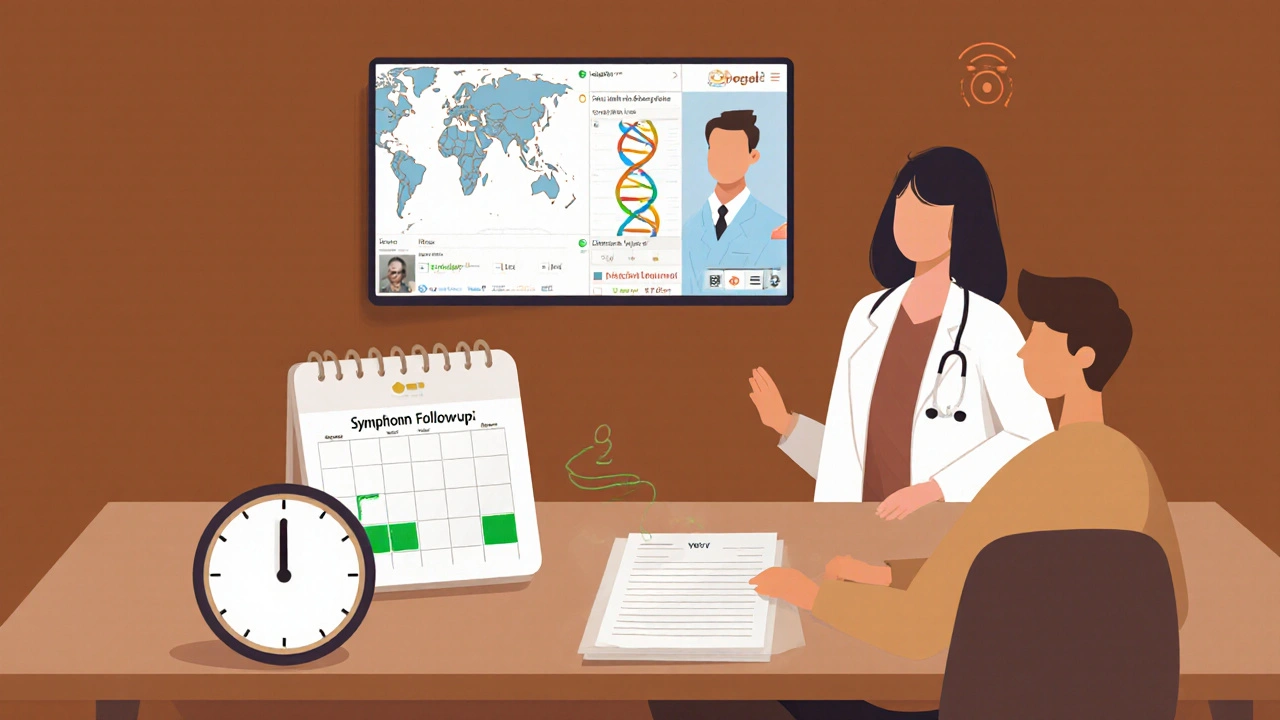
Why Most Drug Holidays Fail
The biggest reason people don’t succeed? They don’t plan for the rebound. Parents think: “My kid’s not in school - why keep the meds?” But social skills, impulse control, emotional regulation don’t take summers off. The same goes for depression. Feeling okay in April doesn’t mean you’re cured in July. Another problem? Family pressure. “You look so much better without the pills!” But that’s not the full picture. The person might be smiling, but they’re also snapping at everyone, forgetting appointments, zoning out during conversations. And then there’s the temptation to extend the break. “Just one more week.” That’s how relapses start.What’s Changing Now
The future of drug holidays isn’t about guessing. It’s about precision. In 2023, the FDA approved a new extended-release form of bupropion with built-in “holiday windows” - designed to give a controlled, predictable break for SSRI side effects. Meanwhile, the NIH’s SPRINT trial is testing whether genetic testing can predict who can safely take a break and who can’t. Telehealth platforms like Cerebral and Done are seeing 40% year-over-year growth in consultations for structured medication breaks. That’s not because people are self-medicating. It’s because they’re seeking expert help to do it safely. And AI tools? They’re coming. By 2026, risk-assessment algorithms will analyze your history, medication, genetics, and symptoms to predict your likelihood of relapse during a break. This isn’t sci-fi - it’s in development.The Bottom Line
A drug holiday isn’t a vacation. It’s a medical procedure. It can help. But only if you treat it like one. If you’re struggling with side effects, talk to your doctor. Don’t stop on your own. Don’t rely on internet advice. Bring your symptom log. Ask: “Is there a safe way to reduce these side effects?” For some, a two-day break every weekend restores intimacy. For others, a summer pause lets their child eat again. But for many, the risks outweigh the rewards - especially if the condition requires constant chemical balance. The science is clear: planned, monitored, individualized breaks - yes. Impulsive, unsupervised stops - no. Your health isn’t a trial-and-error experiment. It’s a partnership. And the best decisions come from data, not desperation.Can I take a drug holiday if I feel fine on my medication?
No. Feeling fine is exactly why you shouldn’t stop. Drug holidays are meant to address side effects or test if you still need the medication - not because you think you’re cured. Stopping when you feel good increases your risk of relapse, especially with antidepressants and ADHD meds. Always consult your doctor before making any changes.
Are weekend breaks safe for SSRIs like Prozac?
Yes - for some people, under supervision. Fluoxetine (Prozac) has a long half-life (4-6 days), which makes short breaks safer than with other SSRIs. Studies show about 65% of users experience improved sexual function without mood changes. But this only works if you’ve been stable for at least six months, track your symptoms, and have a plan to restart if needed. Never try this with paroxetine or venlafaxine.
What happens if I stop my ADHD medication suddenly?
You’ll likely experience rebound symptoms: increased impulsivity, irritability, trouble focusing, and emotional outbursts. In children, this often leads to social problems, accidents, and school difficulties. One study found 78% of kids showed worse behavior during summer breaks. The risk of emergency visits and family conflict rises significantly. Always taper off slowly under medical guidance.
Which medications are absolutely unsafe to stop abruptly?
Beta-blockers, anticonvulsants, corticosteroids, and certain anti-anxiety meds like benzodiazepines. Stopping these suddenly can cause seizures, heart attacks, adrenal crisis, or severe withdrawal. These drugs require gradual tapering - never abrupt stops. If you’re unsure, check your medication’s FDA label or ask your pharmacist.
How do I know if a drug holiday is right for me?
Start by tracking your symptoms for 4-8 weeks: side effects, mood, sleep, energy. Then talk to your doctor. Ask: “Is this side effect severe enough to justify a break?” “What’s my relapse risk?” “What’s the safest way to pause?” If your doctor doesn’t have a protocol, ask for a referral to a specialist. Never make this decision alone.
Can telehealth services help with drug holidays?
Yes. Companies like Cerebral and Done have seen 40% annual growth in consultations for structured medication breaks. They offer telehealth assessments, symptom tracking tools, and follow-up appointments - all designed to keep you safe during a planned pause. But they’re not a substitute for your primary care provider. Use them as a supplement, not a replacement.
Is it okay to extend a drug holiday if I feel good?
No. Extending a break beyond your agreed plan increases relapse risk. For antidepressants, 33% of patients experience symptoms returning within 14 days. For ADHD meds, behavioral regression often worsens over time. What feels like “feeling better” might just be the absence of medication - not true wellness. Stick to your timeline. If you want to extend, talk to your doctor first.
14 Comments
Wiley William
They’re lying to you. Big Pharma doesn’t want you to feel better-they want you hooked. A ‘drug holiday’? That’s just a loophole they invented so you keep buying pills. They know if you take breaks, you’ll realize you don’t need the damn things. Look at the data-they cherry-pick the 65% who ‘benefit’ and ignore the 35% who crash. Wake up.
Richard H. Martin
STOP. STOP. STOP. You CANNOT just ‘take a break’ from SSRIs! You think you’re smart? You think you’re in control? NO. You’re one missed dose away from brain-zap hell. I’ve seen it. My cousin went off paroxetine ‘for a weekend’-ended up in the ER with seizures. Don’t be that guy. Medication isn’t a video game. You don’t pause it when you’re bored.
Tim H
so i tried a weekend break on my adderall last summer... yeah it was a disaster. my kid was running around like a caffeinated raccoon. i almost called 911 when he tried to climb the fence. but honestly? the sex stuff with my wife? wow. like, 10/10. so now we do it every other weekend. my doc says ‘no’ but i dont care. she doesnt live in my skin.
Umesh Sukhwani
This is a deeply nuanced topic requiring careful medical supervision. In many cultures, including mine, the idea of self-adjusting pharmaceutical regimens is viewed with profound caution. The risks of destabilizing neurochemical equilibrium far outweigh the potential for temporary relief of side effects. I urge all readers to consult licensed professionals before considering any deviation from prescribed treatment protocols.
Vishnupriya Srivastava
Interesting how the article cites Reddit and Drugs.com as primary sources for real experiences but ignores the systemic bias in those forums. The people who post are the ones who had bad outcomes or dramatic ‘successes.’ The silent majority-the ones who took a break and felt nothing-don’t comment. That’s selection bias, not evidence.
Matt Renner
As a clinical pharmacist with 18 years in psychiatric meds, I’ve seen this play out hundreds of times. The weekend SSRI break works for about 1 in 3 stable patients-only if they’ve been on the same dose for 9+ months, have no history of withdrawal, and have a reliable support system. Most patients don’t meet these criteria. The data is clear: structured > spontaneous. Always document. Always follow up. This isn’t a hack-it’s medicine.
Ramesh Deepan
I’ve worked with families in India where ADHD meds are stigmatized. Many parents want to stop during summer to ‘save their child from being labeled.’ But without structure, the child suffers more-teachers notice, friends drift away, confidence shatters. A supervised break can help, yes-but only if the whole family is educated. The real issue isn’t the drug. It’s the lack of support systems around it.
Wayne Rendall
It’s worth noting that the SMART trial’s findings on HIV were not merely about ‘risk’-they were about mortality. The increase in opportunistic infections was statistically significant (p < 0.001), and the trial was halted on ethical grounds. This is not a case of ‘some people benefit.’ This is a case of institutional failure. The same principle applies here: if the data shows harm at scale, individual anecdotes are irrelevant.
Scott Horvath
my therapist said i could try a 72 hour break. i did. felt like a zombie for two days. then i got my groove back. now i do it every month. nobody needs to know. its my body. its my brain. i dont need a doctor to tell me how to live.
Armando Rodriguez
While the article presents a balanced view, I must emphasize the ethical responsibility of clinicians to prioritize patient safety above perceived quality-of-life improvements. The notion of ‘resetting’ neurochemistry through unsupervised cessation is biologically implausible and potentially dangerous. The burden of proof lies with the patient and provider to demonstrate that benefits outweigh the known risks of discontinuation syndrome, relapse, and long-term neuroadaptation.
jennifer sizemore
My husband took a weekend break from his SSRI last year and we actually had our first real conversation in 2 years. No more emotional distance. No more ‘I’m fine’ lies. It wasn’t perfect, but it was real. We cried. We talked. We restarted after 72 hours. It’s not about quitting meds-it’s about reclaiming your humanity. If your doctor won’t help you do it safely, find one who will.
matt tricarico
How quaint. A ‘drug holiday’-as if this were a spa retreat and not a neurochemical minefield. The article romanticizes what is, in essence, a form of self-experimentation disguised as medical advice. The fact that telehealth startups are profiting off this trend only confirms the commodification of mental health. Real medicine doesn’t market ‘holiday windows’-it manages chronic conditions with rigor.
Patrick Ezebube
They’re all lying. The FDA? Big Pharma? The NIH? They’re hiding the truth. Drug holidays work because the system wants you dependent. They know if you take a break and feel better, you’ll ask why you were on it in the first place. That’s why they push ‘relapse risk’-to scare you. Look at the history: they said the same thing about smoking, about sugar, about vaccines. They always lie. Wake up.
Kimberly Ford
To anyone thinking about this: if you’re even asking this question, you’re already in the right place. Don’t be afraid to talk to your doctor. Bring your symptom log. Ask for a taper plan. Ask for a referral. You’re not being ‘difficult’-you’re being responsible. Your mental health matters enough to do this right. You deserve to feel like yourself-not just ‘not depressed.’
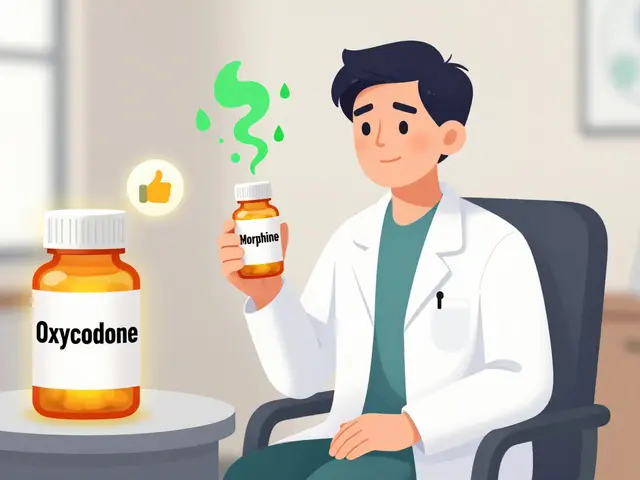

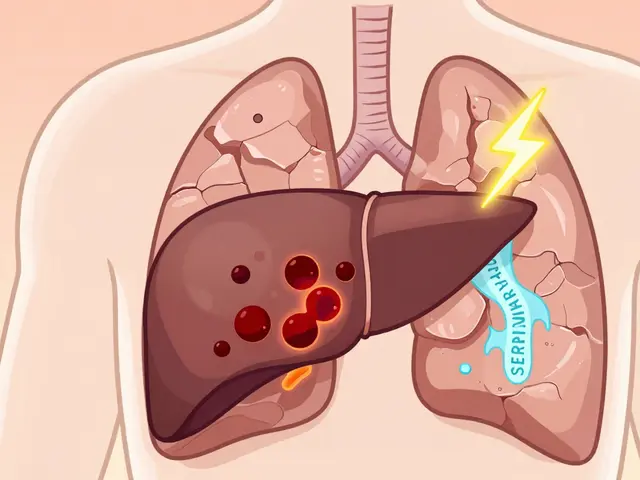
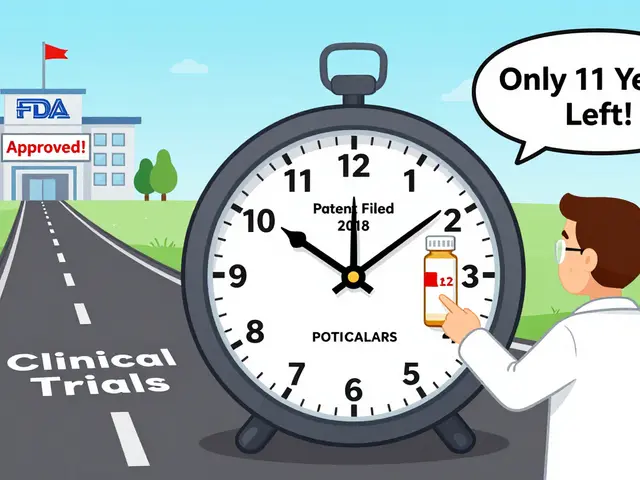


Write a comment